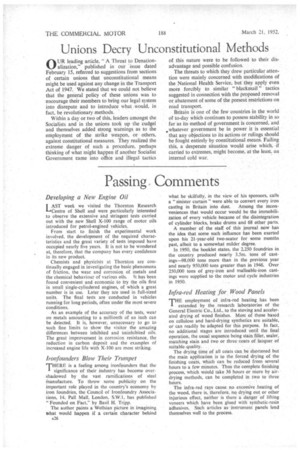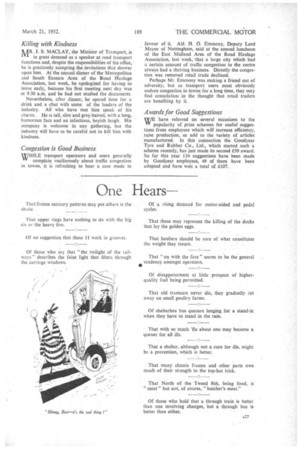Passing Comments
Page 28

Page 29

If you've noticed an error in this article please click here to report it so we can fix it.
Developing a New Engine Oil
LAST week we visited the Thornton Research I-4Centre of Shell and were particularly interested to observe the extensive and stringent tests carried out with the new Shell X-100 range of motor oils introduced for petrol-engined vehicles.
From start to finish the experimental work involved, the development of the required characteristics and the great variety of tests imposed have occupied nearly five years. It is not to be wondered at, therefore, that the company has every confidence in its new product.
Chemists and physicists at Thornton are continually engaged in investigating the basic phenomena of friction, the wear and corrosion of metals and the chemical behaviour of various oils. It has been found convenient and economic to try the oils first in small single-cylindered engines, of which a great number is in use. Later they are used in full-sized units. The final tests are conducted in vehicles running for long periods, often under the most severe conditions.
As an example of the accuracy of the tests, wear on metals amounting to a millionth of an inch can be detected. It is, however, unnecessary to go to such fine limits to show the visitor the amazing differences between inhibited and uninhibited oils. The great improvement in corrosion resistance, the reduction in carbon deposit and the examples of increased engine life with X-100 are most striking.
Ironfounders Blow Their Trumpet
THERE is a feeling among ironfounders that the significance of their industry has become overshadowed by the vast ramifications of steel Manufacture. To throw some publicity on the important role played in the country's economy by iron foundries, the Council of Ironfoundry Associations, 14, Pall Mall, London, S.W.1, has published "Founded on Fact," by Basil H. Tripp.
The author paints a Wellsian picture in imagining what would happen if a certain character behind A26
what he skilfully, in the view of his sponsors, calls a "sinister curtain" were able to convert every iron
casting in Britain into dust. Among the inconveniences that would occur would be the immobilization of every vehicle because of the disintegration of cylinder blocks, brake drums and 68 other parts.
A member of the staff of this journal now has the idea that some such influence has been exerted upon his 21-year-old two-seater for some months past, albeit to a somewhat milder degree.
In 1950, the booklet states, the 2,250 foundries in the country produced nearly 3.5m. tons of castings-98,000 tons more than in the previous year and nearly 950,000 tons greater than in 1946. Over 250,000 tons of grey-iron and malleable-iron castings were supplied to the Motor and cycle industries in 1950.
Infra-red Heating for Wood Panels
THE employment of infra-red heating has been extended by the research laboratories of the General Electric Co., Ltd., to the stoving and accelerated drying of wood finishes. Most of those based on cellulose and hard-drying synthetics are suitable, or can readily be adapted for this purpose. In fact, no additional stages are introduced until the final operation, the usual sequence being stain filler, sealer, matching stain and two or three•coats of lacquer of suitable . quality.
The drying time of all coats can be shortened but the main application is to the forced drying of the finishing coats, which can be reduced from several hours to a few minutes. Thus the complete finishing process, which would take 36 hours or More by airdrying methods, can be completed in two to three hours.
The infra-red rays cause no excessive ,heating of the wood, there is, therefore, no drying out or other injurious effect, neither is there a danger of lifting veneers which have been glued with synthetic-resin adhesives.. Such articles as instrument panels lend themselves well to the process.
Killing with Kindness
MR. J. S. MACLAY, the Minister of Transport, is in great demand as a speaker at road transport functions and, despite the responsibilities of his office, he is graciously accepting the invitations that shower upon him. At the annual dinner of the Metropolitan and South Eastern Area of the Road Haulage Association, last week, he apologized for having to leave early, because his first meeting next day was at 9.30 a.m. and he had not studied the documents.
Nevertheless, after dinner, he spared time for a drink and a chat with some of the leaders of the industry. All who have met him speak of his charm, .He is tall, slim and grey-haired, with a long, humorous face and an infectious, boyish laugh. His company is welcome in any gathering, but the industry will have to be careful not to kill him with, kindness.
Congestion is Good Business,
WHILE transport operators and users generally complain vociferously about traffic congestion in towns, it is refreshing to hear a case made in favour of it. Aid. H. 0. Emmony, Deputy Lord Mayor of Nottingham, Said at the annual luncheon of the East Midland Area of the Road Haulage Association, last week, that a large city which -bad a certain amount of traffic congestion in the centre always had a thriving business. Directly the congestion was removed retail trade declined.
Perhaps Mr. Emmony was making a friend out of adversity, but as transport users must obviously endure congestion in towns for a long time, they may find consolation in the thought that retail traders are benefiting by it.
Awards for Good Suggestions
WE have referred on several occasions to the " popularity of prize schemes for useful suggestions from employees which will increase efficiency, raise production, or add to the variety of articles manufactured. In this connection the Goodyear Tyre and Rubber Co., Ltd., which started such a scheme recently, has just made its second £50 award. So far this year 134 suggestions have been made by Goodyear employees, 49 of them have been adopted and have won a total of £107.




















































































